#FEMA maps
Explore tagged Tumblr posts
Text
Houston Flood Zones Slash Home Values 18%, Buyers Pause
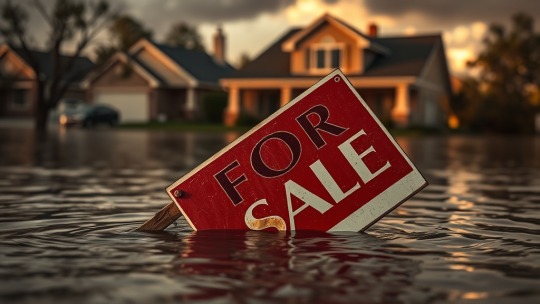
FEMA Flood Maps Create Stark Value Divisions Across Harris County PropertiesInvisible lines from federal flood mapping now cut through Harris County's real estate, sharply dividing property values. Neighbors can see dramatic wealth differences with properties just feet apart.Homes within FEMA's 100-year floodplains face an 18% drop in value. Meanwhile, nearby homes outside these zones keep their full market price. This makes buyers wary of flood-zone properties.Real estate sales in flood areas often drag on as buyers carefully check insurance requirements and lender restrictions. Market activity slows significantly for homes marked with federal flood zone designations.A looming expansion threatens to add thousands more Harris County properties to high-risk categories by early 2025. Updated maps will stretch flood zones from 150,000 to almost 200,000 acres. Properties within the floodway face the strictest regulations as this zone closest to water bodies is heavily regulated by city or county authorities.Reclassification from new maps will suddenly require insurance for homeowners previously unaffected. Mortgage lenders will demand flood insurance on properties entering risk zones, changing neighborhood market dynamics.New 2025 Disclosure Laws Force Transparency in High-Risk Neighborhood SalesStarting January 1, 2025, new disclosure laws will eliminate the secrecy previously surrounding flood-damaged properties in Texas. Sellers must disclose if properties have experienced flooding or if flood damage insurance claims have been made.Properties in 100-year or 500-year floodplains, floodways, flood pools, or reservoirs now require mandatory disclosure. Real estate agents face increased liability, with potential legal consequences for not advising proper flood risk inquiries.The case *Calhoun v. I-20 Team Real Estate, LLC* highlights these risks.Beyond homeowners, landlords must also inform tenants of flood hazards affecting rental properties. One-third of flood insurance claims occur in low to moderate risk areas, demonstrating that flooding can happen anywhere regardless of official risk designations.Buyers gain enhanced awareness through required disclosure of drainage issues and flood insurance histories. Legal experts anticipate these transparency mandates will further disrupt markets, following 2019 laws that led to a 4.2% price drop in 500-year flood zones.Concealing flood-related information now poses serious ethical violations and legal penalties for professionals in the industry.Home Elevation Emerges as Critical Strategy to Protect Investment ValueHow can Houston homeowners salvage their property investments when flood zones continue to devastate real estate values across the region?Home elevation has emerged as one of the most effective flood resilience strategies available to property owners facing the relentless threat of flooding.The practice involves raising house foundations above FEMA base flood elevations. This provides essential investment protection against future disasters.Benefit CategoryFinancial ImpactTimelineInsurance PremiumsReduced ratesImmediateProperty ValueMaintained/increased1-2 yearsDamage PreventionAvoided repair costsPer flood eventMarket AppealFaster salesOngoingNew Houston regulations mandate elevation 24 inches above 500-year flood levels. This replaces the weaker 18-inch requirements above 100-year floods.Elevated homes show measurable resilience against the 18% average value decline plaguing Houston flood zones. Properties using pier and beam foundations with proper elevation maintain competitive positioning.These homes stand strong despite widespread market hesitancy surrounding flood-prone areas.Insurance Costs and Extended Market Times Reshape Buyer Decision-MakingProperty elevation strategies alone cannot shield Houston homeowners from the cascading financial pressures reshaping the local real estate market.Flood insurance premiums averaging $1,500 to $2,000 annually now force buyers into extensive insurance comparisons before committing to purchases.
Properties in FEMA-designated high-risk zones experience extended market times as potential buyers hesitate over mandatory insurance requirements and perceived flooding risks.Buyer hesitance intensifies when flood insurance estimates arrive, leading many deals to pause or collapse entirely.The thorough cost evaluation includes recurring insurance expenses alongside traditional homeownership costs, making flood-prone properties notably less attractive.Market data reveals properties in designated flood zones remain unsold longer than comparable non-flood zone homes.Extended listing periods create downward pressure on prices as sellers reduce asking amounts to compensate for insurance burdens.FEMA flood zone classifications directly influence buyer confidence levels.Zone D uncertainty creates prolonged decision timelines.Rising premiums tighten lending requirements, while private insurance markets offer limited relief at higher costs, fundamentally altering Houston's real estate dynamics.AssessmentHouston's flood zone crisis represents a fundamental shift in real estate dynamics. FEMA designations now dictate property values with mathematical precision.The 18% decrease in value signals a permanent change in risk assessment for America's fourth-largest city.Mandatory disclosure laws eliminate decades of information asymmetry. They force unprecedented transparency in flood-prone markets.Elevation strategies and insurance calculations have become survival mechanisms. In this investment environment, water determines wealth.
0 notes
Text
Texas Flood Round Up: Published 7/12/25
1 note
·
View note
Text
New data reveals the inadequacy of FEMA flood maps : NPR
[News] More cabins and buildings at Camp Mystic — the tragic site of more than two dozen deaths in the Texas flood — were at risk of flooding than what the federal government had previously reported, according to new blockysis from NPR, PBS’s FRONTLINE and data scientists. Maps by First Street, a climate risk modeling company in New York City, show at least 17 structures in the path of flood…
0 notes
Text
New Flood Zone Maps in Florida

Flood zone classifications in Florida are changing, and updated maps now reflect more detailed and localized data. These New Flood Zone Maps in Florida are part of a statewide initiative to provide more accurate assessments of flood risk.
Here’s what homeowners should know:
Your property’s zone may have changed, affecting your insurance costs or requirements.
More properties are now classified as high-risk, leading to mandatory flood insurance.
Updated maps account for elevation, rainfall, and proximity to water bodies more precisely than before.
Even homes outside high-risk zones may still face flood threats—and insurance is still recommended.
Check FEMA’s map service center or consult your insurance agent to review your current zone.
Flood zone maps help determine insurance premiums and availability. Knowing your zone helps you plan ahead and understand your coverage needs.
If your area is a flood zone or you’re seeing map changes, learn more about flood insurance in Florida and how Boyd Insurance can guide you through your options.

#flood insurance in Florida#boyd insurance#Flood Zones Florida#FEMA Mapping Florida#Florida Flood Risk
0 notes
Text
Today in 🍂✨October surprises✨🍂

• Secretary of Transportation Pete Buttigieg and Secretary of Labor Julie Su quietly assisted in winning labor rights for dockworkers, ending a strike that could have had catastrophic economic consequences. (10-4-24)
• In Springfield, Ohio, where Haitian migrants have been blamed for the disappearance of local animals with Trump claiming “‘migrants are walking off’ with geese in the town” and “they’re eating the dogs” - a lie also promoted by JD Vance, Ohio’s own sitting Senator, with no evidence - it turns out that the missing geese were actually the victims of a 64-year-old white man who was hunting illegally. (10-3-24)
• A Trump-appointed federal judge blocked Biden’s student loan forgiveness plan again after another judge reinstated it earlier this week. (10-3-24)
• Republicans and crazy Facebook uncles everywhere have spent this week spreading disinformation about the FEMA response to Hurricane Helene, including AI photos of Trump standing in floodwater and wild claims that Biden is sending money to undocumented immigrants. In reality, the Biden-Harris administration has provided substantial emergency assistance and both Biden and Harris have visited the region. Meanwhile, it turns out that Trump was the one who redirected money from disaster relief to send to ICE during his presidency. Shocker. (10-4-24)
• Seriously, though, Trump is not who you want to call in an emergency. Before allowing disaster relief to reach victims of wildfires in California, then-president Trump forced aides to show him an electoral map to see if he had voters there. He evidently intended to withhold the aid if he found out it was going to mostly Democratic voters. This would be a career-ending scandal in any other political era but alas, we are living in this one. (10-3-24)
• Finally, far-right extremist and Oklahoma superintendent of schools Ryan Walters intends to put Bibles in public schools, which is already disturbing, but in a stunning display of corruption, the only ones that meet his specifications are the so-called “Trump Bibles” that include the Constitution and Declaration of Independence. They go for $60 apiece and Trump gets fees from each one. (10-4-24)
No, wait, I’m going to say that one again:
In Oklahoma, taxpayers’ money will be used to put Trump Bibles in public schools. Their money will go directly to Trump. Not a joke!!! Not an exaggeration!!!
…Surely the voters who are still undecided are lying, right?? Right?!
30 days until Election Day.

Go to vote.org for a sample ballot, early voting dates, and more. Seriously, we have to win.
#guys should I start a substack#joking but seriously. Pay Attention! It’s Time! lots happening and#remarkably little reporting on the wildfires thing and the julie su/pete buttigieg win!#I think the Oklahoma thing is actually organized crime?#he already has a rico case is he trying to get another one#us politics#mine#us news#kamala 2024#vote
4K notes
·
View notes
Text
Justice 40
Joe Biden is boring and often bad at tooting his own horn, but by god, he is good at process.
Justice 40 is simple but powerful application of that. its a shift in how the executive branch works. 40% of money from a bunch of existing programs should go to census tracts that are overburdened with pollution, at higher risk for climate change, and have been historically underserved.
The shorthand here is basically "communities that don't have enough internal resources to deal with long term problems". So yes, communities that had been redlined for decades, ones that have Superfund sites, ones that have high rates of asthma from air pollution.
and this is by census tract. Not city. census tract. So parts of New York City qualify... but other parts don't. And the city HAS to use the money in the targeted part. it doesn't go into the communal pool. it's for THAT tract specifically.
Also all land federally recognized as belonging to a Native American tribe and all Alaskan Native Villages qualify, specifically.
And again, this is for existing programs that are already running and have existing staff and budgets. They're supposed to prioritize grants and projects for those areas specifically. And that's everything from Department of Agriculture, to FEMA, to Labor, to Environmental Protection.
Does it instantly get rid of all the baked in racism from decades past? No, not even close. But it puts in a countermeasure that has a concrete and measurable goal to aim for rather than a nebulous "suck less." even if the administration changes, many of those changes will stick.
And as things improve, some tracts may come off the list! Some may go on that weren't there before!
You can see a map here. Blue highlighted tracts are "disadvantaged" so qualify for that extra assistance! Check and see if you live in one or part of your town does. Because if you've been hearing constantly "we can't afford to fix X problem..." and you're in that tract.... there's money available. For you. Build that sidewalk, fix those lead pipes, get that brush truck your volunteer fire department has been asking for.
And tell your local officials that! "did you look at Justice 40 for funding". And even if they're doing their best, particularly people in little towns.... being a government official isn't their full time job. They may have missed it. Just asking them about the program may suddenly open a world of possibilities.
9K notes
·
View notes
Text
Welp. FEMA's national risk index map has been taken offline. This was a crazy valuable tool for analyzing disaster risk. And now it appears to be gone.
253 notes
·
View notes
Text
Are you aware of ALLIGATOR ALCATRAZ?
"This site is a multigenerational home for the Indigenous peoples of Florida, and it is not the home of a harmful and unnecessary prison." - Friends of the Everglades
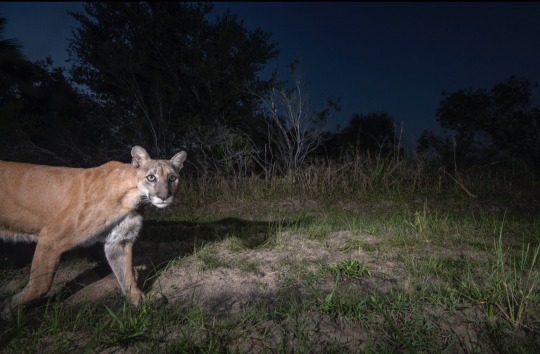


Source
“Alligator Alcatraz” is an immigrant detention center being built illegally in the Big Cypress Preserve of the Florida Everglades to house 5,000 people in tents in summer, with plans to use alligators and snakes as opposed to walls and buildings as a deterrent to the people being kidnapped, trafficked, and contained.
“State authorities project that the center will be operational at the beginning of July, with an initial capacity of at least 1,000 detainees and a gradual expansion thereafter”
As of 6/26: Construction has already started and has been connected to LOGISTIC EVENT CORPS and US TENT RENTAL. FL National Guard and Highway Patrol have been sent to “secure the perimeter and entry points of Alligator Alcatraz”. Homeland Security is largely funding it with FEMA (Federal Emergency Management Agency) using its Shelter and Service Program, which usually allocates money to governments and nonprofits to “provide migrants with temporary shelter, food and transportation”.
There are 15 Miccosukee and Seminole villages in Big Cypress, which also supplies 40% of their drinking water, but the tribes WERE NOT CONSULTED and EXPLICITLY OPPOSE construction.
The Mayor of Miami is opposing construction until environmental impact assessments are done and is reportedly considering legal action
“Levine Cava also reported that the state of Florida offered only 20 million dollars for the property, while its most recent appraisal exceeds 190 million”
DeSantis has claimed the project has zero environmental impacts, which has been vehemently denied by environmentalists:
"There will be impact because sewage will be generated, water will be used, and it will create light pollution affecting the habitat” - Eve Samples, Executive Director of Friends of the Everglades
“She also contends the state failed to follow proper procedure by skipping a required environmental review before building a federal facility. Samples raised additional alarm over the threat to endangered species, noting that Florida Fish and Wildlife Conservation Commission (FWC) maps show panthers living in the area.”
“In addition to the criticisms of the immigration plan itself, construction in this region -considered ecologically sensitive- could cause irreversible damage to the ecosystem of the Everglades, one of the most important natural reserves in the United States.” [x]
In 1969, Marjory Stoneman Douglas founded Friends of the Everglades to stop construction in the same location based on the findings of the 1st ever environmental impact study done in FL and was successful
"Development of the proposed jetport and its attendant facilities will lead to land drainage and development for agriculture, transportation, and services in the Big Cypress Swamp which will inexorably destroy the south Florida ecosystem and thus the Everglades National Park."
US President Ford established Big Cypress National Preserve in 1974 In order to “assure the preservation, conservation, and protection of the natural, scenic, hydrologic, floral and faunal, and recreational values of the Big Cypress Watershed”
Call Scripts:
Use these exactly, or use pieces, or base your own message on them - as long as you contact ASAP
Friends of the Everglades: “Dear Gov. DeSantis and Attorney General Uthmeier, Don’t make the same mistake Florida avoided 55 years ago. I’m urging you to STOP the reckless plan to build an “Alligator Alcatraz” detention center in the heart of the Everglades. This land is critical to the future of the Everglades — that’s why thousands of Floridians joined forces to stop the Everglades Jetport from paving over this very ground in 1970. Now Attorney General Uthmeier wants to do what even President Nixon’s administration knew was wrong: open the door to development in one of America’s most fragile and iconic ecosystems, surrounded by Everglades National Park and Big Cypress National Preserve. You have the power to stop this anti-Everglades proposal, and I’m calling on you to use it. NO AIRPORTS. NO ROCK MINES. NO PRISONS on this land. ONLY EVERGLADES! Sincerely, [your info here]”
Jessica Namath: “My name is (name] and I'm calling to ask that you help protect our nation's FIRST National Preserve - Big Cypress - and stop "Alligator Alcatraz". The Everglades are no place for ANY 1,000 person facility. The infrastructure can't support it, and the impacts to the indigenous community and ecosystem would be catastrophic. Please oppose this terrible idea!”
Sierra Club FL Chapter: “Dear Governor DeSantis - You have repeatedly claimed to be a defender of the Everglades. Now is the moment to back up those words with action. The proposed “Alligator Alcatraz” ICE facility would devastate a vital part of the Everglades — undoing decades of restoration progress and wasting billions of taxpayer dollars already invested in protecting this unique ecosystem. This project threatens to destroy the very heart of the River of Grass, undermining the hard work of generations of advocates and scientists dedicated to restoring Florida’s natural heritage. I urge you to listen to the thousands of Floridians who stand against this plan. Show real leadership by rejecting this harmful project and fully committing to protecting and restoring the Everglades for future generations. The time to act is now. Stop Alligator Alcatraz, and stand by your promise to protect the Everglades. Sincerely, [your info here]”
Friends of the Everglades provide this to contact DeSantis and Uthmeier. You can also email DeSantis through his website, or use the contact info below:
DeSantis Mailing Address: The Capitol / 400 South Monroe St. / Tallahassee, FL 32399-0001 | DeSantis Phone: (850)717-9337 or (850)488-7146
Uthmeier Mailing Address: Office of the Attorney General / State of Florida /!PL-01, The Capitol / Tallahassee, FL 32399-1050 | Uthmeier Phone: (866)966-7226
Call the companies involved and confront their complicity, demanding they stop their service
US Tent Rental (Sarasota, FL): (941)727-3311
Logistics Event Corps (SweetWater, FL): (305)232-8368
BTW DeSantis has already said he wants to build another detention center at Camp Blanding, 30 miles West of Jacksonville, in Northeast FL
#god bless america#impeach the kkking#alligator alcatraz#ron desantis#james uthmeier#everglades#florida wildlife#florida#Seminole#Miccosukee#indigenous communities#indigenous history#environment#environmentalism#immigration#immigrants#us news#us politics#politics#trump#trump administration#big cypress national preserve#marjory stoneman douglas#activism#advocate#advocacy#conservation#national guard#highway patrol#wildlife
75 notes
·
View notes
Text
The Category 4 hurricane, bordering on Category 5 [as of Tuesday Oct. 8], was expected to reach Florida's Gulf Coast between 10 p.m Wednesday and 2 a.m. Thursday, according to the latest forecasts.
“You have time today. Time is running out," Gov. Ron DeSantis told reporters on Tuesday. "But you do have time today to heed any evacuation orders and do what you need to do to protect yourself and our families.”
Sarasota Mayor Liz Alpert said she's confident her constituents understand the consequences of not evacuating. "What everyone has been saying is, you have to evacuate, it is not survivable, to survive a 10- to 15-foot storm surge," Alpert told NBC News on Tuesday. "It just simply isn't."
Mr. Biden said he pre-approved emergency declarations in Florida and had sent FEMA administrator Deanne Criswell to Florida on Monday. He also called on airlines to provide "as much service as possible" and "not engage in price gouging."
Mr. Biden said he had spoken to "all political leaders" in the region, "some of them more than once," and he said he told them "anything they ask for, they can get."
I don’t want to add to people’s anxiety about this if you’re already safe or following the story from afar, but if this kind of warning convinces anyone to evacuate or make sure their loved ones do, it’s worth it. If you want to evacuate now but you don’t know where to go, lists of shelters by county are over here.
More about the predicted path:
It’s also been pointed out that you can travel north OR south—the hurricane is cutting across the state. Ideally you would get out of the path entirely, but any distance from the direct line of impact and/or the coast would help, even a little:
Scroll way, way down for the interactive map, which I have screenshots of below (again, accurate as of midday Tuesday October 8th). The hurricane will weaken as it hits land, but it’s still wildly intense, considering:
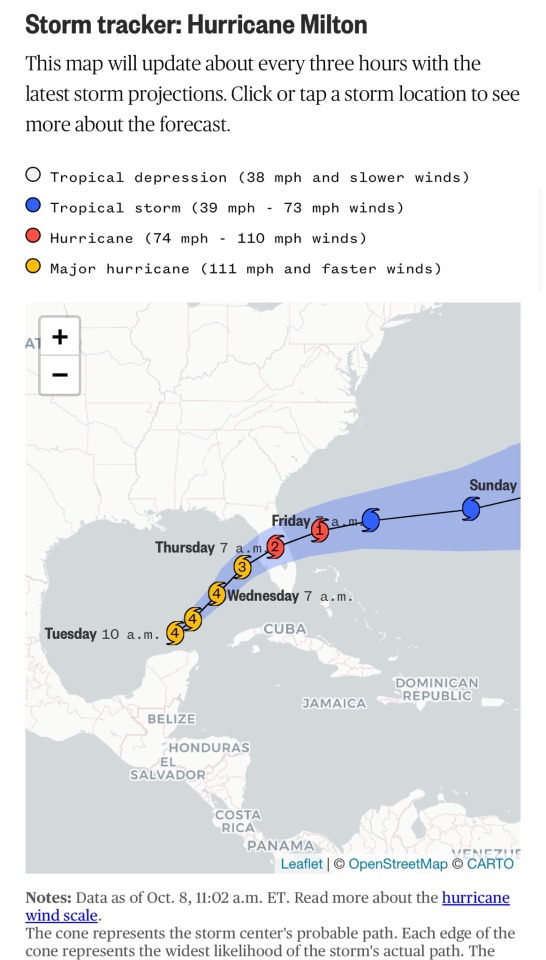
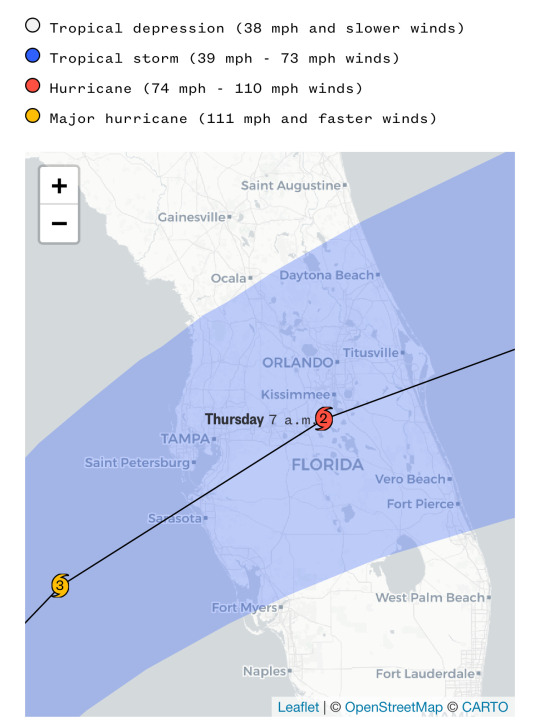
I wasn’t online much the week of Helene, or I would have posted then too. But Helene also gave us an idea of how bad things could get, and a baseline for “even worse,” so that’s one of the reasons I’m posting all this now. (I also have the luxury of being in a different state. I’m not someone to worry about.) I’ll look for disaster relief resources and post those when the time comes. I hope people are still helping Asheville and NC, but this is gonna have to be my lane for now.
#hurricanes#hurricane tracker#forecast maps#shelters#hurricane milton#florida#I have eight news apps and I’m dry; I might as well be the one
127 notes
·
View notes
Text
Her life was completely upended in early November of 2018, amid one of the driest autumns on record in the Sierra Nevada, when the deadly Camp Fire swept into her hometown of Paradise, Calif., killing 85 people and destroying nearly 19,000 structures — the most expensive climate-related disaster in the world that year. "There are positives," she says. "My family got out alive." But Foudray's family home, a two-bedroom two-bath mobile, was a total loss. Five years later, she's still mostly living in an RV on her burned-out lot, hoping to get a new home within the next year.
[...] In the weeks and months immediately after the Camp Fire, survivors were anxious to get home. They soon became frustrated, angry about the slow pace of even just removing the fire debris. Then as the months dragged on, the scope of what was ahead began to settle in. It took nine months just to remove all the hazardous toxins and debris piles before the first homes could be rebuilt. Paradise's recovery had a lot stacked against it from the beginning due to its largely elderly and low-income population. Many were forced to leave in search of affordable housing.
[...] Originally built out into dense forests, Paradise today is a changed land. One million trees have been removed; the coastal range to the west and Sawmill Peak and the Sierra foothills to the east are now visible. Roads are being newly paved or reconfigured and blocked by flaggers. Utility crews are digging trenches and burying all the new power lines underground. And main thoroughfares are clogged with construction traffic. All the new homes have to meet tougher wildfire codes, including a new local ordinance that bans any porches or other fixtures built from combustible materials in the immediate perimeter of houses.
[...] This costs a lot of money. And it turns out a lot of the aid coming into disaster areas — like the millions pouring into Lahaina right now — tends to go to rebuilding infrastructure, not individual private homes. "We're not good at this in our country," says Ed Mayer, executive director of the Housing Authority for Butte County, which includes Paradise. "Our history of disasters, and no fault of their own, FEMA sort of has a one size fits all approach." The U.S. government typically comes in and tries to help people find temporary housing quickly while disaster victims figure out how to rebuild. But Mayer says that doesn't work in states like California and Hawaii where there has been a worsening affordable housing crisis for years. "Our wish at the very outset of this disaster was, hey, we want some soap bubble housing," Mayer says. "And when I say soap bubble housing, we want some housing we can erect tomorrow."
Still, five years later, Mayer's office is celebrating some successes. There are some 3,000 affordable housing units now in development in the county, thanks in large part to housing officials leveraging aid and various grants. Most are not in Paradise, however, and officials say it's probably a fraction of what's actually needed. In the days after the fire, an estimated 35,000 displaced people flooded into nearby cities like Chico.
79 notes
·
View notes
Text
Good morning. Where do I even start today- trying to keep up with disaster relief is tough since a lot of my normal sources are without power or incredibly focused on doing the actual recovery.
I guess I'll start with one of the sources I get a lot of breaking news from and what he said yesterday:

Ryan Hall is a YouTube weatherman with an incredible team that delivers free weather broadcasting through his YouTube lives during major events. He's from east Kentucky and is very invested in Appalachia weather recovery and awareness. The man's a local and he's part of the reason I'm even aware of the risks heavy rains can bring in this region of the states.
And this post from the national weather service office in Greenville - Spartanburg SC, that serves a wide area around it;
"this is one (forecast) we wanted to get wrong. this is the worst event in our office's history."
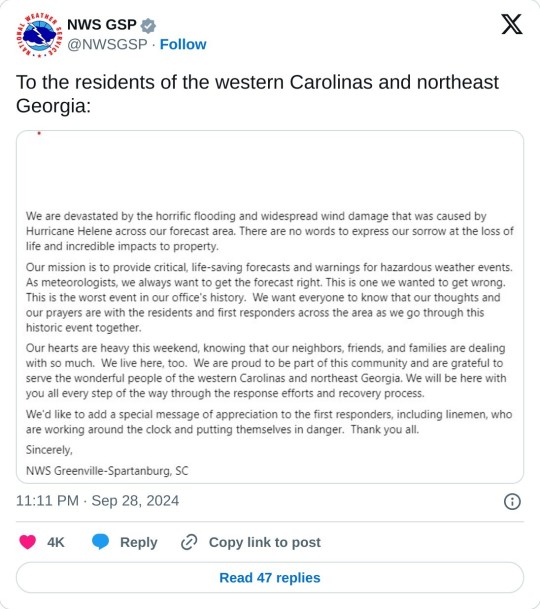
This thread concludes: media was sent to Florida and so a lot of people don't quite know what's going on in appalachia- if you can I suggest reading this person's entire thread, which is too long for me to type or try to post on here and keep it readable, so try the second link under here for an unrolled thread that'll be easier for screen readers;
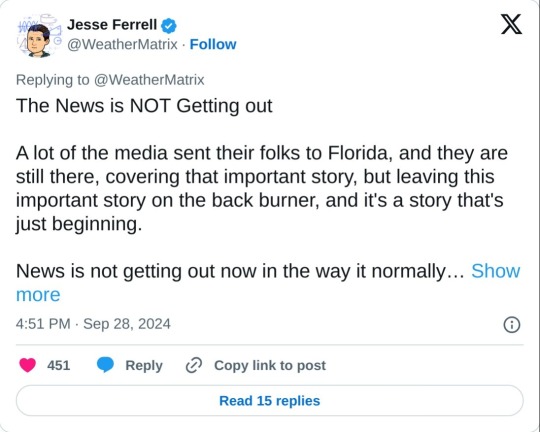
Minor update from yesterday's post: the governor of Tennessee finally fucking declared a state of emergency after his shitty day of prayer and fasting announcement. It took him like six hours to get off his ass and do it.
The power is still majorly out as of this morning in a vast area of the states. As you can see, a majority is in Appalachia, central Georgia, and the Florida big bend. Florida, I know for a fact, has tons of electrical technicians working to restore power and cell service.
This map really highlights the state divide from eastern Tennessee/Kentucky and the Carolinas too.
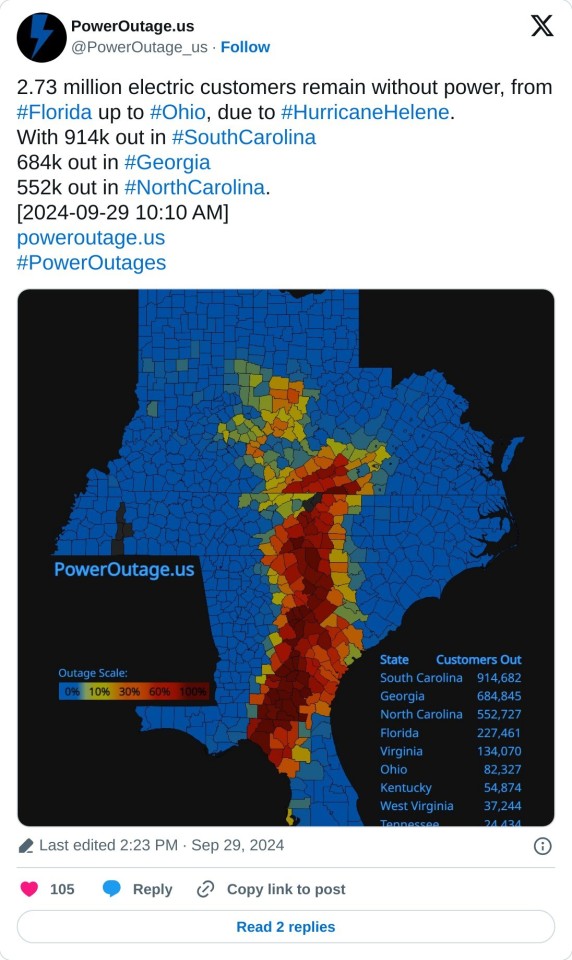
Despite the doom and gloom, a few things are starting to get better.
Quite a few dams managed to hold, and some roads in west NC are more passable, but there are so many people reporting that it was taking them upwards of seven hours to get out of Asheville, which is a major city.
Below has a few pics and statements about the state of roads late last night/early today.
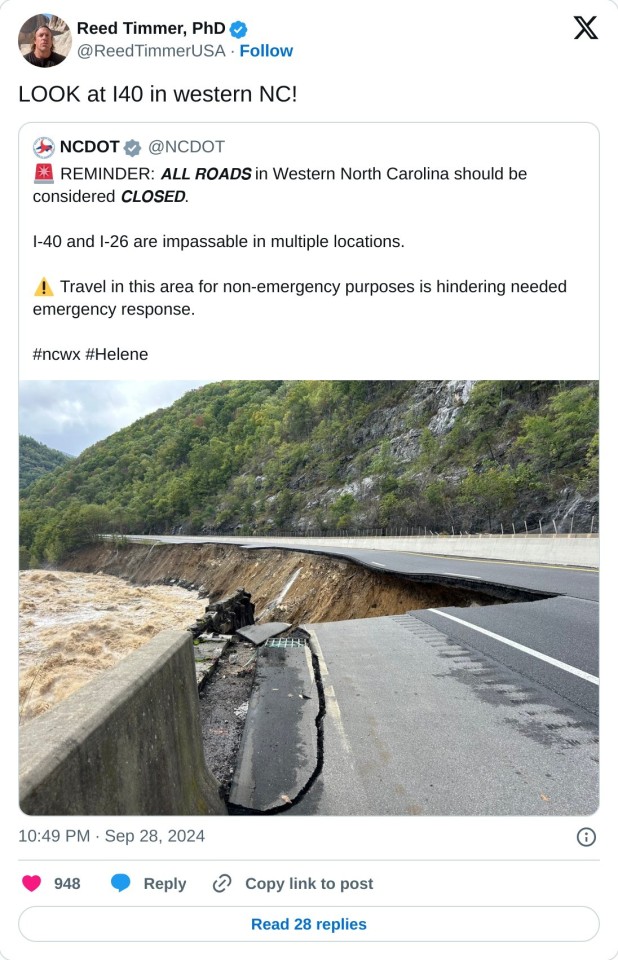
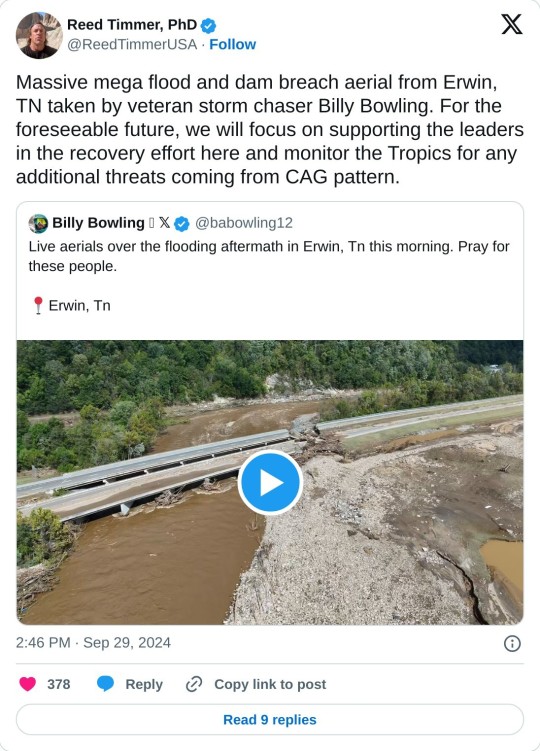

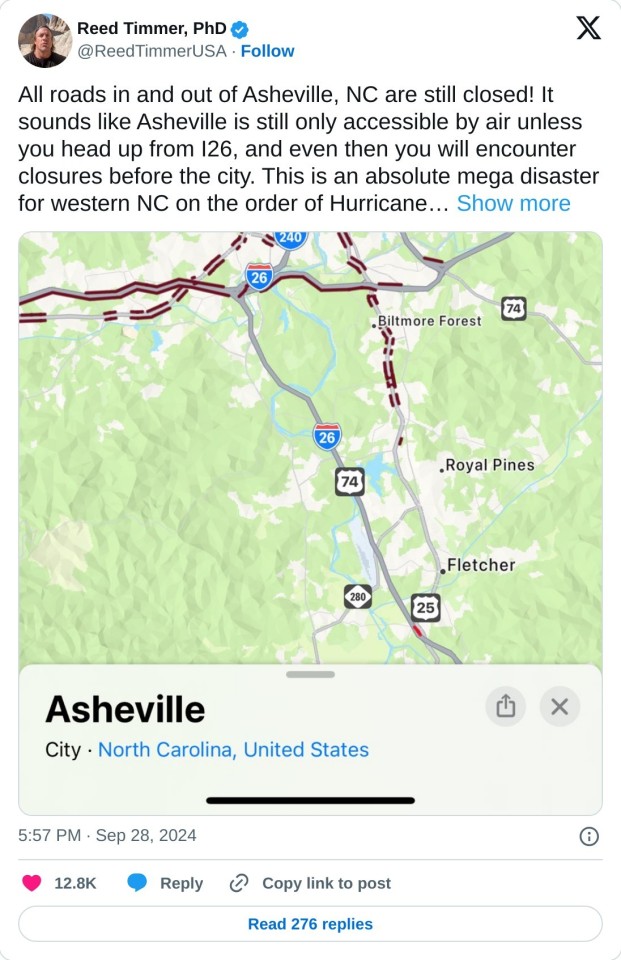
The end of this tweet says "this is an absolute mega disaster for Western NC on the order of hurricane Katrina."
With how long the recovery might actually take, I'm certainly hoping it's handled better. One of the responses on this thread mentions no military presence/help as of 20 hours ago, but this has since changed with the national guard finally deploying in some areas.
Overall, fooding hit historical levels in a lot of states, with Atlanta GA even declaring a flash flood emergency at one point, which is the highest risk level of a flash flood warning - it means "get out and get up high NOW"
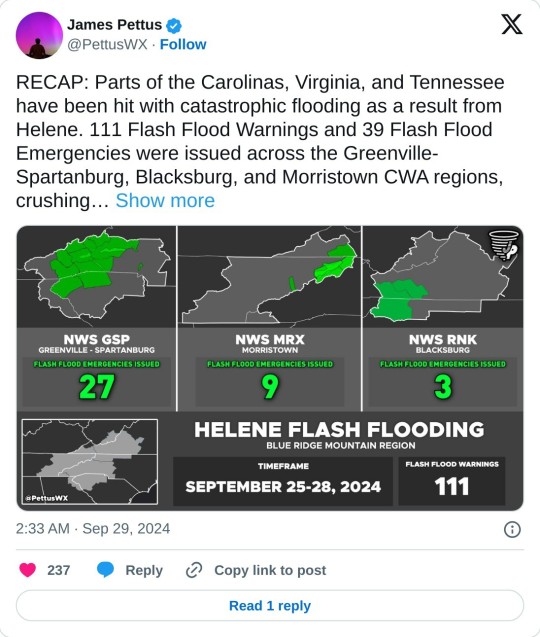
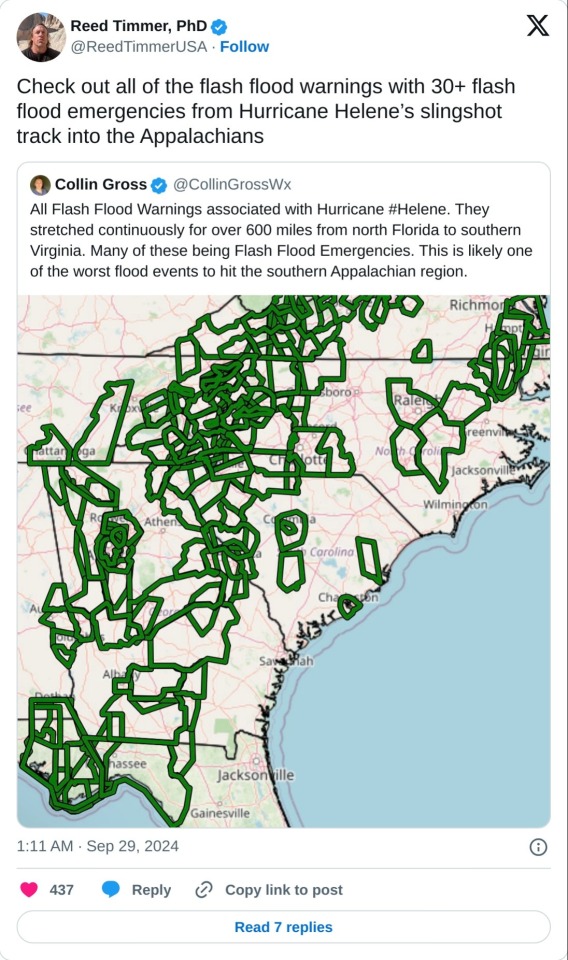
Rescue and recovery operations are on the way.
Local groups, storm chasers, and organizations are on the way. The national guard is deploying and helicopters are coming from volunteers and the military alike in the most affected areas.
Chris Hall, a storm chaser who works with a lot of organizations, has been driving around doing things like setting up starlink access in Asheville and helping serve hot food with a Florida based disaster recovery group since Friday.
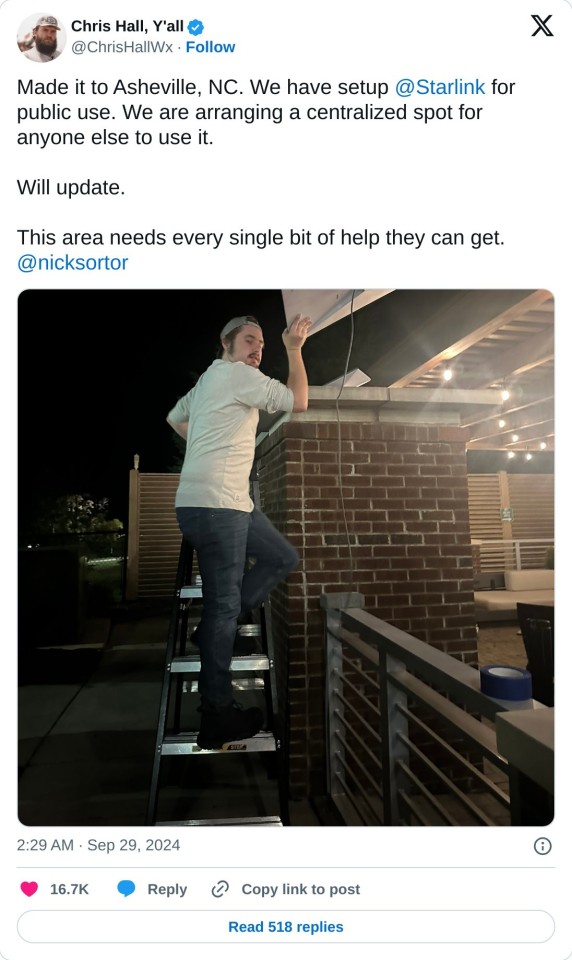
Hell he even posted this, which if you know the waffle house index, is a little neat to see- for context, fema will look at waffle house closures in areas hit by natural disasters to gage preliminarily relief need.
Waffle houses are infamous for never closing. So for a limited menu to be served, it means this spot in GA was still hit pretty hard.
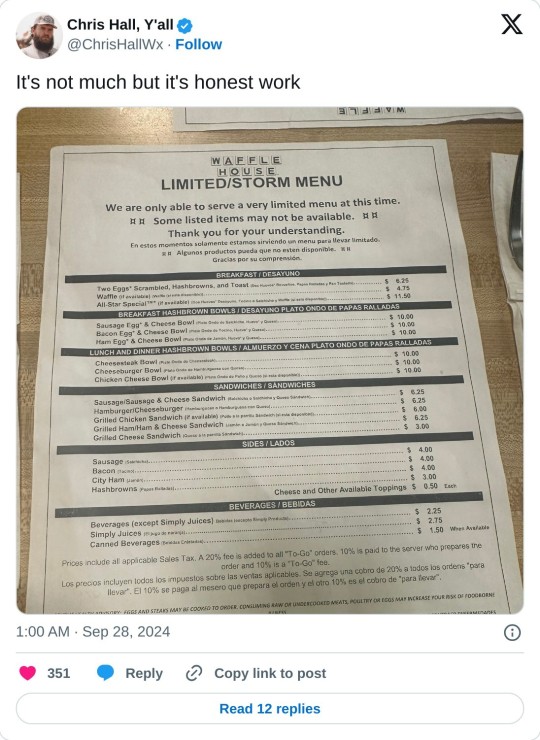
If you want to and can, here is one place with local donation resources for west NC
And different organizations and weather community types to help that are boots on the ground type volunteers with a bit more of a national focus;
If you are good at adding alt text or doing text description for screen readers, please help me with these posts. It is incredibly hard to do those sorts of things on mobile due to my own limitations.
Please be safe.
90 notes
·
View notes
Text

It's absolutely essential to have an emergency kit, or to build one tailored to your needs. Don’t put it off or assume you’ll be fine without it. Being prepared can make a real difference when things go wrong.
In recent years, we’ve faced all kinds of unexpected events: earthquakes, floods, the pandemic, severe snowstorms, and most recently, a massive power outage across parts of Europe. These situations have shown just how unprepared many people are.
Think about how much worse that blackout could have been if it happened in the middle of winter, during a heatwave, or if it had lasted for days instead of just hours. The consequences could have been far more serious.
Please take the time to prepare now, even if it’s just a few small steps. That way, you won’t be caught off guard when something bad happens and your future self will be glad you did.
Heavy-duty, durable backpack
LED flashlight (with extra batteries)
Battery-powered or hand crank AM/FM radio (NOAA Weather Radio, if possible)
Portable backup battery or power bank for mobile devices (with phone charger)
Candles, matches, lighter or a fire starter in a waterproof container
First-aid kit
Mess kits, paper cups, plates, paper towels and plastic utensils
Moist towelettes, garbage bags, and plastic ties (for sanitation)
Feminine supplies and personal hygiene items
Non-perishable food (such as canned goods or packaged items)
Manual can-opener (optional)
Water (bottled and/or water purification tablets—for drinking and washing)
Prescription medications and glasses
Non-prescription medications (pain relievers, anti-diarrhea medication, antacids, laxatives)
Cash (Do not rely on credit cards or debit cards)
Important documents: Copies of insurance policies, medical info, bank records, birth certificate and proof of address. Store them electronically or in a waterproof container.
Sleeping bag or emergency blanket
Multi-purpose tool
Whistle (to signal for help)
Hand Warmers
Dust-protection face mask
Duct tape
Map(s) of the area
Books, cards, puzzles, or other non-electric games to pass the time
Pet food and extra water for your pet
Infant formula, bottles, diapers, wipes and diaper rash cream
Not every item on this list may apply to your situation, so choose what makes sense for you. Remember, it's better to have something and not need it than to need it and not have it. Make sure to also keep your kit up to date and replace any expired items as needed.
For more information, visit official government websites for reliable emergency preparedness resources and trusted news outlets for the latest alerts and expert advice such as...
The American National Red Cross - What Do You Need In A Survival Kit?
The National Weather Service (NWS) - Building an Emergency Winter Supply Kit for Your Car
Ready.gov - Build A Kit
FEMA (Federal Emergency Management Agency) - 10 Items to Include in Your Emergency Kit
Virginia Department of Emergency Management (VDEM) – Emergency Kit
CDC (Centers for Disease Control and Prevention) - Prepare un kit de emergencia
Government of the Netherlands - What does the emergency kit contain?
Ministerio de Asuntos Exteriores, Unión Europea y Cooperación (MAEUEC) - Guía de emergencia (PDF)
euronews - Esto debe incluir el kit de emergencia que propone la UE ante peligros como un gran apagón
euronews - Francia enviará a sus ciudadanos una guía para sobrevivir a guerras, pandemias y otras crisis
National Geographic (España) - El kit de emergencia que la UE recomienda tener en todos los hogares
El Pais - Agua, comida y medicinas: qué incluir en un kit de emergencia como el que recomienda la UE
infobae - Apagones, desastres naturales o guerras: cómo es el kit de supervivencia que recomienda la Unión Europea para catástrofes
Publico - Água, comida, lanterna, cobertor, canivete… O que deve ter um kit de emergência?
Santander - E se o inesperado acontecer? Saiba o que deve ter no kit de emergência da União Europeia
ECO News - O que devemos ter num kit de emergência?
Ministère de la Transition écologique - Préparer son kit d’urgence 72h
Service d’Information du Gouvernement (SIG) - Se préparer à une situation d’urgence
Croix-Rouge Française - Catakit : Préparer son sac d’urgence
#electricity#europe#spain#portugal#blackout#europe blackout#iberian peninsula#power outage#spain blackout#portugal blackout#france blackout#emergency kit#survival kit#survival#emergency preparedness kit#bug-out bag#kit de emergência#kit de emergencia#thoughts
14 notes
·
View notes
Text
Helene: The Aftermath in Appalachia
Today marks 5 weeks since Hurricane Helene wreaked havoc on East Tennessee and Western North Carolina. If you aren't aware, Hurricane Helene is no longer considered a natural disaster. The storm has been upgraded to a Geological Event.
This means that Helene changed the actual geological features of our area. Whole mountain tops are washed away in North Carolina. Also, in North Carolina, entire towns are literally gone, washed away, leveled completely. They may not be able to rebuild to be on future maps ever again.
In Hartford, Tennessee (where white-water rafting is a main source of tourism), the flooding changed the course and width of the river. The rapids have even changed so that the rafting companies are unsure when or if they'll be able to open for next season. Where there was farm acreage before in Cocke County, Greene County, and other East Tennessee counties there is now riverbed, including HUGE river rocks, instead. Even if the riverbed wasn't physically deposited in people's farms, the condition of the soil has been changed, and they don't know when or if they can use that land to farm crops again.
Hours after the water rushed through, we knew that some roads between Tennessee and North Carolina were washed away. However, five weeks later, we are seeing more bridges collapse in my area because of the force of the water that rushed underneath them. A railroad trestle collapsed and fell into the road at the end of last week in my area as a direct result of the flooding. (No one was hurt, thank goodness.) In places where the river made it right up to the banks of the roads, those roads are collapsing in some areas now and requiring closures for repair or indefinite closes and rerouting traffic.
Even with the help of TEMA, FEMA, and Dolly Parton, government officials are saying that it may take upwards of a decade for us to recover from this storm. But, with all the changes caused by Helene, what will that recovery look like? We don't know yet. It's five weeks later, and we're still figuring out all the damage Helene caused.
#east tennessee#western north carolina#tennessee#north carolina#hurricane helene#tropical storm helene#appalachia#appalachian mountains#natural disasters#geological event#recovery
28 notes
·
View notes
Text
@nicksortor
UPDATE: Elon Musk says FEMA’s “potentially illegal payments will now be PAUSED for review” 🔥
Biden’s FEMA gave over $1 BILLION to NGOs who were focused on facilitating illegal immigration.
This is in addition to the use of FEMA money meant for AMERICANS suffering from disasters to fund luxury hotels for illegals.
Notably, FEMA funneled money to the Red Cross, which was used to assist illegals in getting to the U.S. Mexico border, literally providing them MAPS to get to entry points.
And that’s just scratching the surface.
MANY corrupt officials are sweating right now!


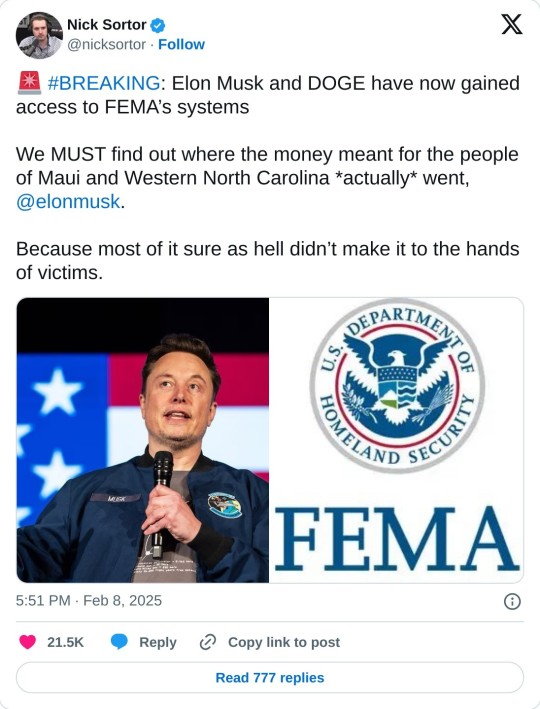
18 notes
·
View notes
Text
If you’re nervously watching fire in the greater Western United States, I highly recommend the Watch Duty app. It aggregates both official updates and on the ground firefighting reports. It’s used by professional firefighters to coordinate information as well as being public.
I came across it this summer through an old hat backcountry firefighter friend. While I was nervously watching many parts of my county conflagrate. If you’re at risk you can enter your home address and it will notify you of danger. Or monitor family and friends.
If you find it helpful, please consider donating to them (I really like watching the airplanes and helicopters with the pro version). They’re going to be under sudden massive traffic from second largest city in the US all joining. They’re a great resource.
I also highly recommend the FEMA app. Enter your address and it will send you National Weather Service warnings. It also has disaster preparedness guides and can help with disaster relief applications if the worst happens.
https://www.fema.gov/about/news-multimedia/mobile-products
15 notes
·
View notes
Text
Ok to that one anon who keeps sending me asks about all the ways in which trump/musk will declare martial ("marshall") law and cancel/rig all future elections:
I like cannot assure you with 100% certainty that this won't happen. There's a bunch of reasons why it likely won't, and a bunch more reasons why it would likely be unsuccessful, but it could happen and i need you to just square with that. Trump could declare martial law. He could also die within the next year. A big black piano could fall on my head tomorrow. Do you get me.
If this is causing too much extreme anxiety for you, then game it out. I'm not one to give advice about successfully coping with things, esp now, but there ARE some useful techniques to help confront a certain scenario:
- let's say it happens. Trump declares martial law/some type of emergency powers 3 weeks before midterms. Maybe he does it next month. What do you do? What do you have on-hand to support the things that are important to you? Who do you know are involved with the things you care about? Who depends on you and how far can you afford to stick your neck out? What are you willing to do (be honest)?
- also you mention the china-style internet blackouts. I kind of don't even want to give this the time of day but theres sooo many reasons outside a government blackout to like. Have your important contacts and addresses and documents and money on-hand and not just in your phone. Maybe even make a plan or invest in a landline or a ham radio - a natural disaster is likely to cut power before musk/whoever do and there's no FEMA coming to help any of us so i would honestly worry about THAT before anything else lol
3. Ok the "cancelling" of elections. Do you know your rights? Do you know who your elections officials are at different levels and do you have their phone numbers handy? Are you aware of any organizations that protect the vote and are willing to exert pressure IRL and not just online or in the courts? Honestly if we're at a point where for some reason an attempt to halt or delay free and fair elections is not only possible but successfully enforced by the gov, we're basically in the martial law scenario above and consequently those actions would apply.
4. I think its actually reasonable to be concerned about our election integrity. Many of the national agencies handling election security have been compromised and we never got a full accounting of the extent of interference in 2016, 2020, 2024 in its various forms. But for something like this the best cure is prevention. Make the 2026 elections your priority NOW. if you live in a state with less secure practices for ballot counting try and change the procedure. Get involved with precinct level election officials and train to be a judge or an observer. Make the 2026 elections your hobby NOW, because even if they do "cancel" them or w/e you will have cultivated a hyperlocal network of not just officials but other people who care about the same things we do, who can help you to ensure your community stays resilient and ready to respond to the challenges that will follow.
And again, i heard Trump's little ominous comment of wiping blue states off the map or whatever but please don't add to his power by letting him manifest his success. It never hurts to believe he will try, and to do everything you can to trump-proof our elections.
16 notes
·
View notes